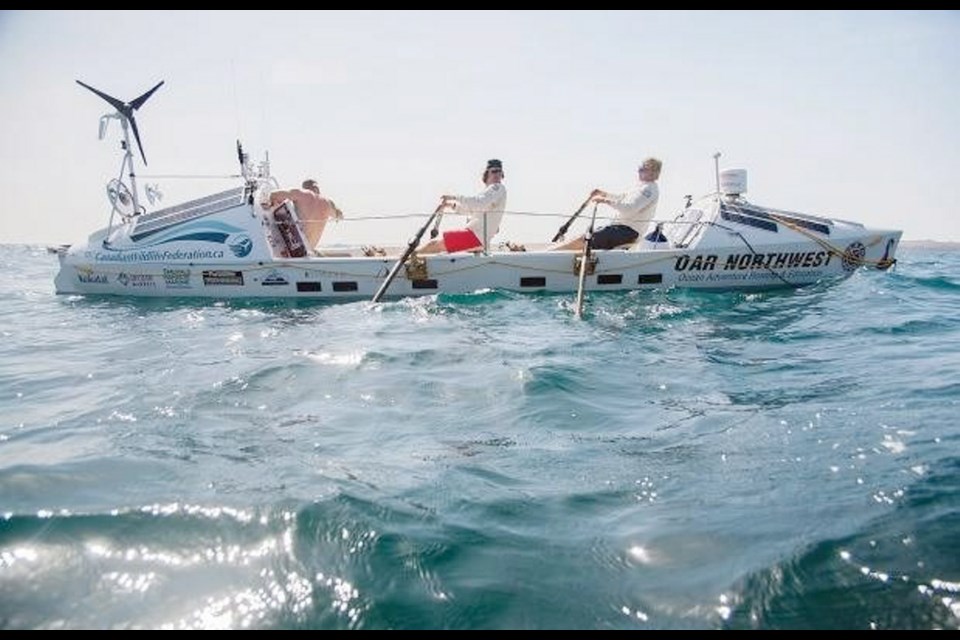A team of rowers seeking to cross the Atlantic Ocean has reached dry land weeks ahead of schedule, after their boat capsized Saturday.
Adam Kreek, an Olympic gold medallist and former University of Victoria rower, as well as Tofino’s Markus Pukonen and Seattle’s Jordan Hanssen and Pat Fleming, arrived Sunday in San Juan, Puerto Rico.
“Here they come,” expedition mission controller Greg Spooner said via a telephone interview from San Juan at 6:42 p.m. PDT Sunday as he spotted them. Moments earlier, a passing cruise ship gave a welcome-back honk to the rowers.
“They are uninjured, shaken, but excited to get back to land this evening to reunite with family and friends, and share the challenges and great successes from the 73 days at sea prior to the capsize,” Spooner had written on the expedition blog earlier Sunday.
After the rowers arrived at the U.S. Coast Guard station in San Juan, customs paperwork delayed their reunion with supporters for hours after the arrival of the commercial vessel that picked them up. With the boat overturned, the two Canadians had left their passports on the abandoned vessel.
Meanwhile, a welcome party awaited them, camped out in a coast guard boardroom.
“Everyone’s very excited to see them,” said Stephanie Poff, a communications officer with the Canadian Wildlife Federation, interviewed by telephone from the room. “The U.S. Coast Guard has been very generous. We’ve got a whole operation set up in this boardroom.”
The mariners were 73 days into their 6,700-kilometre transatlantic rowing expedition from Senegal to Florida when the boat capsized. They had expected to reach Miami within weeks.
On Friday, the crew reported via Twitter that a lightning storm had passed overhead.
“Jordan’s beard was rising to the sky and glowing, and both antennas were glowing at their tips. Lots of loud thunder and intense eye-shattering lightning. Wow. Crazy freaky,” said the tweet.
Shortly before 3:50 a.m. PDT on Saturday, the boat overturned and the crew called for help through a personal locator beacon attached to a life-jacket.
The rowers were 640 kilometres north of Puerto Rico — an area forecasting a cold front with strong winds and rain.
They were able to safely deploy their life raft and awaited rescue, Spooner wrote on the expedition’s blog. A U.S. Coast Guard C-130 aircraft made visual and radio contact with the overturned boat and the raft.
A passing commercial vessel, the Heijan, picked up the men.
The boat was designed to right itself after capsizing but did not do so, Spooner said.
The incident followed years of preparation and planning, Spooner said.
“Unfortunately, careful planning cannot make an important expedition 100 per cent safe,” he said.
He thanked the coast guard and other agencies that successfully located and rescued the rowers. “They put their lives at risk to save [the rowers],” Spooner said.
The expedition, sponsored by the Canadian Wildlife Federation and Ocean Adventure, Rowing and Education (OAR Northwest), left Dakar, Senegal, on Jan. 23.
The crew rowed the open ocean, self-supported 24 hours a day, with each member rotating through two-hour shifts.
A computer program, developed at UVic, monitored the crew’s activities and ensured they followed a strict schedule that maximized their energy and mental sharpness.
There was also scientific equipment on board to monitor the ocean conditions and marine life.
[email protected]
[email protected]



